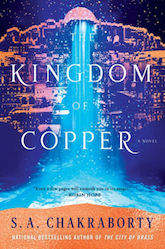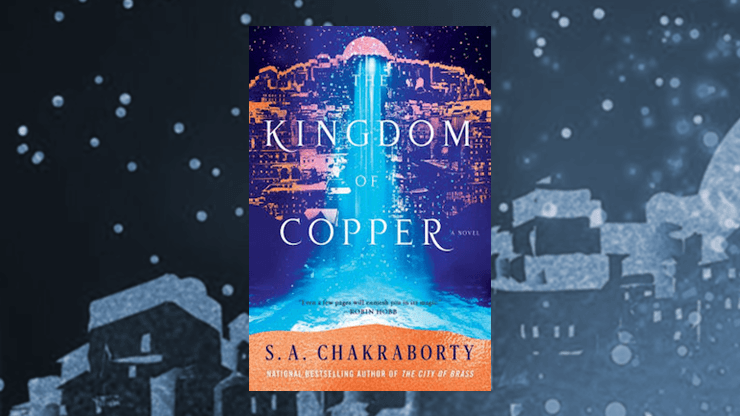We leap in to The Kingdom of Copper right where we left off with The City of Brass (if we can recall just where we left off), and then quickly jump to five years later, when Nahri and Muntadhir are married and living under his father King Ghassan’s rule: Muntadhir keeping up with his harems, following in his father’s methods, and Nahri working as the only Nahid, the healer for the djinn. Alizayd is in a village far away, helping irrigate the dessert with his new abilities of ‘finding’ springs, and Dara is with the original Nahid, training an army to take back Daevabad. Each character is caught up in their own plot, each plot is built up and interwoven with the others as the narrative progresses.
Chakraborty seems to be continuing her exploration of the ideas of colonisation, genocide, and the racial and ethnic biases that fueled The City of Brass. Nahri continues to be sympathetic towards the shafit—the half human, half djinn of Daevabad, who are considered its second-class citizens or even, at some level, unwanted refugees trying to find their djinn relatives. This is an interesting aspect of the djinn world Chakraborty has created, with most djinn being vehemently against the shafit and not bearing any sympathies towards them. Nahri is often told that they are simply not the djinn’s problem, though as she points out, “we’re not supposed to …creep through the human world, seducing virgins and starting wars,” and yet that is exactly what many djinn have done, resulting in the birth of so many shafit who then try to make their way to where their ancestors or djinn parent came from, only to be rejected by the ‘pure bloods’ who created them. It’s colonisation at its supernatural best/worst, and it doesn’t take much to see how it reflects the current world.
But this takes second place in The Kingdom of Copper, as Chakraborty navigates the large cast and further develops her characters and their relationships. Watching Alizayd with his new crew, one may completely forget that he was formerly a bit of an extremist who had been fuelling insurgents in Daevabad, for example. Some characters now act in ways that seem contradictory to what we recall of them from the first book, but Nahri remains her stubborn self; she wants desperately to open up an old hospital her ancestors once ran, so that she can work alongside a shafit doctor and help every citizen of Daevabad, regardless of their race. Such a thing is unheard of, but since Nahri has nothing else going for her (her marriage is empty, her only friend has vanished after killing her lover, she is trapped into service), she struggles to make the hospital a reality. What she doesn’t know is that there is a great deal of action unfolding around her; plans in which she isn’t the centre of focus. As much as the first book was Nahri’s story, this second one is not—narrative perspectives change at every chapter, and narrative voices shift, as does the readers’s empathy towards the characters.
The djinns in Chakraborty’s story are divided into tribes—they are different sorts of djinns, different families, speaking different languages, hailing from different regions. This is worldbuilding, of course, but it can be confusing, especially when you start to wonder how the demons of Zoroastrian lore, Daevas, end up in what’s ostensibly a world based on Middle Eastern Islamic legend of the djinn—or why all djinn are Daeva…until they’re not? For that matter, how does the Avestan Anahita connect to this timeline? But all ancient religious deities from a region can be traced backwards and connected at some level—and this is fiction after all, not written for someone who would necessarily know any of this lore, so this confusion here depends on a reader’s ability to keep up with the various names derived from ancient religions for djinn tribes and their alliances or enmities. This is something that is a common factor in all complex epic fantasy, to some extent, and was a factor of the first book in the trilogy as well. Unlike the first book though, The Kingdom of Copper doesn’t read quite as smoothly. Is it because there is too much going on that is a set up for more to come? Too many palace conspiracies? Too many new alliances? Too many new characters? Subplots? Backstories? Exotic Middle Eastern textures? It’s a bit of a tangled web.
Buy the Book


The KIngdom of Copper
It would be so easy to like this book. It would be so easy to say yes, this writer has touched on all the right notes. It would be much too easy to give in to reading this from a Western gaze, to let a colonial hangover cloud vision, and ignore the aspects of Orientalist fantasy woven through this.
Can you write deftly about a culture that you have adopted? Of course you can. Can you own it the way someone born into it can? I remain uncertain, and Chakraborty has not convinced me just yet, as much as she has indeed done all of the right things—she’s done her research, she’s immersed herself in the religious mythology (as a convert to Islam, much more so than most writers, certainly!), she’s earnest and safe. Possibly a little too safe, because she has to be. But as with The City of Brass, I can’t help but feel that this narrative just plays a little too much to the gallery, and into the cliché of an exotic Eastern fantasy, to make it palatable for an audience looking to diversify their fantasy reading repertoire. Diversity is, of course, currently a key term for publishing and among much of the actively engaged readership of SF/F.
Of course, the onus of deeply, thoughtfully engaging with the narrative, as always, lies with each individual reader. What experience and baggage is the reader bringing to the text? Is the reader actively engaging with the narrative on more than a surface level? Not that each reader needs to do so in order to enjoy a good story, of course—but for readers whose approach is more active than passive , it’s impossible for a writer to control what they’ll take away from it. For some readers, the phrase “khanjar dagger” is necessary to understand the kind of object is being referred to. For other readers who aren’t strangers to the language or culture in question, it’s akin to “chai tea” or “naan bread”—redundant and absurd. I’m one of those readers, so clearly this series isn’t catering to me, as much as I want to like it, and as much as it will be enjoyed by most Western readers (a quick scan through the star ratings on Goodreads shows just how much most readers love this book). Ultimately though, it’s almost impossible for a writer coming from what’s essentially a colonial background to break entirely free of an orientalist gaze, no matter how good a writer’s intent or how involved and detailed their personal background may be.
So if you’re coming from a place where classic djinns of flame and fury are a novel, unique, and exotic element in fantasy, The Kingdom of Copper is highly enjoyable. If you’re coming from a place where djinns are as common as the mundane mangoes and pomegranates and persimmons sold on a cart pushed by a man with a thousand djinn stories of his own—stories that he’d be happy to tell each time you stop him—you’re not going to be quite so entertained. This is a story for strangers in a strange land, but not every reader will find the land strange.
The Kingdom of Copper is available from Harper Voyager.
Read an excerpt here.
Mahvesh loves dystopian fiction & appropriately lives in Karachi, Pakistan. She writes about stories & interviews writers for the Tor.com podcast Midnight in Karachi when not wasting much too much time on Twitter.










